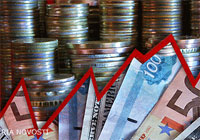Most Russians don’t expect changes in country’s economics in next six months – poll

(Interfax – November 27, 2013) Few Russians believe that the economic situation in Russia will improve and the government can improve the situation in the country in the next half year, and citizens are divided on whether strikes are an acceptable method of resolving vital problems, sociologists from Levada Center told Interfax.
The poll was conducted in 130 populated areas of 45 regions of Russia in mid November. It surveys 1,603 respondents.
Ninety percent of the respondents surveyed by Levada Center said they believe in the Russian government’s ability to improve the situation in the country, and only 7 percent said they are confident that the economic situation in the country will improve in the next six months, the poll showed.
The percentage of those who doubt the government’s ability to improve the economic situation is much higher (39 percent), and another 36 percent were undecided.
Most of the respondents (58 percent) said they do not expect any changes in the economic situation in the country in the next six months, and another 28 percent are concerned that the situation may “get worse”.
Responding to a question as to whether mass protests against the declining living standards are now possible, 68 percent of the respondents said this scenario is not very likely and 26 percent said such protests are likely (a poll on this was conducted in late October).
In the meantime, according to Levada Center, Russians do not tend to believe in the effectiveness of strikes in resolving vital problems.
According to the poll conducted in November, only 11 percent of the respondents find strikes to be the only way of having their demands fulfilled, and the percentage of such respondents has declined by 5 percent points from 2010. The percentage of respondents who believe strikes are effective is the highest among businessmen (29 percent) and students (26 percent).
Twenty-eight percent of the respondents believe that strikes are not effective, and the percentage of such respondents has increased by three percent points from 2010. The percentage of such respondents is high among jobless people (38 percent), managers and people working in administrative positions (35 percent), Russians younger than 25 (31 percent), respondents who have not completed high school (34 percent), and residents with populations of 100,000 to 500,000 people (33 percent).
In the meantime, 31 percent of the respondents are convinced that a strike is an extreme, but unavoidable measure. The percentage of such respondents is high among public servants (46 percent), housewives (38 percent), specialists (37 percent), Russians aged between forty and 55 (37 percent), Russians with university and vocational degrees (each 33 percent), and respondents living in cities with populations less than 100,000 people (34 percent).
Seventeen percent of the respondents believe strikes are a normal method of resolving problems. The percentage of such respondents is high among managers and people working in administrative positions (40 percent), specialists (21 percent), men (20 percent), Russians aged between 25 and forty (21 percent), respondents with university degrees (21 percent), and Muscovites (31 percent). In 2010, 19 percent of the respondents had this viewpoint.
Four percent of the respondents said strikes are simply unacceptable in Russia. The percentage of such respondents is the highest among businessmen (14 percent), women (5 percent), Russians older than 55 (5 percent), respondents with a high school education (5 percent), and residents of Moscow and cities with populations of 100,000 to 500,000 people (6 percent each).
